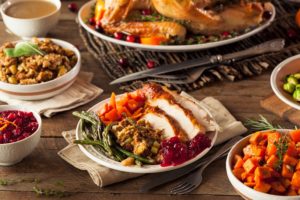Food is as much a part of holiday gatherings as football, decorations and caroling. This holiday season, keep food safety in mind every step of the way, including proper planning, safe shopping, working in the kitchen and wrapping up leftovers.
Regarding the people being the host and hostess cooking the meal for the holiday remember this:
Christmas grocery shopping
For fresh turkey, you need to cook it no later than two days after buying. If you are buying it in person, bring the turkey home as quickly as possible in a separate cool bag. Store your turkey in the bottom of the fridge away from other cooked foods and fresh produce to avoid cross contamination.
What size turkey?
In buying, storing and defrosting your turkey, here is helpful advice for dealing with birds of all sizes in the run up to Christmas. If defrosting, it is important to allow at least 24 hours for every 4/5 lbs (2/2½ kg) of weight. If in doubt, check out turkey defrosting time and tbe calculations listed on the directions of the turkey.
No Matter Vegan food or Meat food, to keep everyone safe follow these steps:
- When you have cooked food and you are not going to eat it straight away or if there are leftovers after serving, place on a clean plate, cover and refrigerate within 2 hours.
- Throw away any high-risk food that has been standing at room temperature for more than 2 hours and throw away all food scraps.
- Remember to use clean dishes and utensils for cooked food to prevent cross-contamination.
- Dividing food into smaller portions and putting it in a shallow dish can help to make it cool more quickly.
- When you are cooling a turkey or other large bird, removing the legs will help it cool more quickly. It is important that leftover cooked rice is quickly cooled and then refrigerated.
- Remember not put food in the fridge when it is still hot, because it could raise the temperature of the fridge and allow other foods to get too warm.
- Never reheat leftovers more than once.
- Leftovers stored in the fridge should be eaten within three days.
Proper Planning
Make sure your kitchen is equipped with what you need for safe food handling, including two cutting boards (one for raw meats and seafood and the other for produce and ready-to-eat foods), a food thermometer, shallow containers for storage, paper towels and soap. Store foods in the refrigerator at 40°F or below or in the freezer at 0°F or below. Check the temperature of both the refrigerator and freezer with an appliance thermometer.
Safe Shopping
It’s important to keep food safety in mind as you shop. Keep raw meat, poultry and seafood separate from ready-to-eat foods like fruit, vegetables and bread. Embrace fruits and vegetables that are oddly shaped but don’t purchase bruised or damaged produce, or canned goods that are dented, leaking, bulging or rusted, as these may become a breeding ground for harmful bacteria.
Choose cold foods last and bring foods directly home from the grocery store. Always refrigerate perishable foods, such as raw meat or poultry, right away.
Working in the Kitchen
In a holiday kitchen filled with family and friends, all hands may be on deck, but are those hands clean? Make sure everyone washes their hands thoroughly with clean, running water and soap for 20 seconds before and after handling food.
And when baking delicious holiday treats, remember that no one should eat raw cookie dough or brownie batter.

